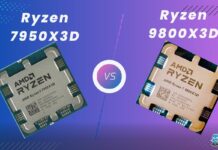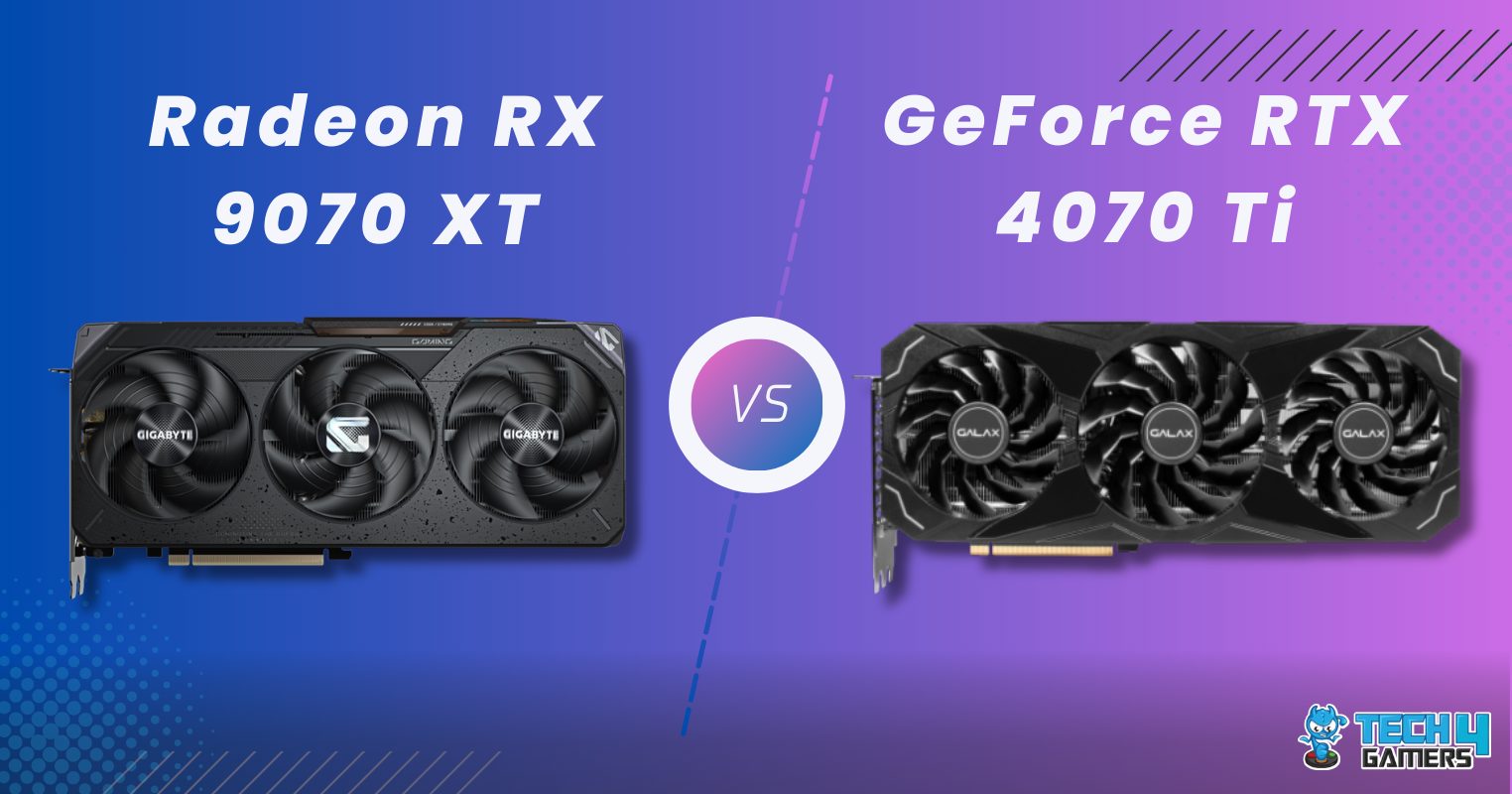The RX 7700 XT has received negative media coverage due to its high price compared to the RX 7800 XT, which offers significantly better gaming performance for only $50 more. To see whether the critiques of the RX 7700 XT vs RX 7800 XT hold any water, join me on my journey to see the true performance of these cards.
Key Takeaways
- The framerate of the RX 7800 XT was around 15% faster on average than the RX 7700 XT in my gaming tests performed at 1440p.
- Surprisingly, I observed that the two cards consumed very similar amounts of power, making the RX 7800 XT more efficient than its little brother.
- The price of these two cards only differs by $50 at launch.
Comparison Table
| Technical Specs | AMD RX 7700 XT | Radeon RX 7800 XT |
| GPU | Navi 32 | Navi 32 |
| Architecture | RDNA 3 | RDNA 3 |
| Base Clock | 1700MHz | 1295MHz |
| Boost Clock | 2544MHz | 2430MHz |
| Streaming Processors | 3456 | 3,840 |
| Compute Units | 54 | 60 |
| RT Cores | 54 | 60 |
| Memory Speed | 430 GB/s | 620 GB/s |
| MSRP | $449 | $499 |
| Best Variants | Best RX 7700 XT | Best RX 7800 XT |
Architectural Differences
- Process Size: Both these RDNA 3 GPUs are based on a chiplet design, meaning they use 5nm manufacturing nodes where the improvements matter, and they use less complex 6nm manufacturing nodes for things like the I/O controller and memory chips.
- VRAM: The RX 7700 XT comes with 12GB of video memory, whereas the RX 7800 XT upgrades it to 16 GB. Both buffers use the same GDDR6 technology, though the RX 7800 XT has a 256-bit bus instead of a 192-bit bus.
- TDP: The TDPs of these cards are very close to each other. The RX 7700 XT is rated for 245 watts, whereas the RX 7800 XT comes in at a little bit over that, supporting a 263-watt TDP.
- Other Features: Both the RX 7800 XT and RX 7700 XT have the same set of features, which include an anti-lag setting, AI upscaling in AMD’s Fidelity FX Super Resolution, and mediocre ray tracing chops.
Benchmarks
Now that the difference in architecture between these two cards has been clarified, it is time to evaluate the real-world performance of the RX 7700 XT vs RX 7800 XT. To do this, I fired up my test bench with the following specifications:
- OS: Windows 11
- CPU: Intel Core i7-13700K
- Motherboards: ASRock Z790 Taichi Lite Motherboard
- RAM: Kingston Fury Renegade RGB DDR5 32GB 7200MHz
- SSD: XPG GAMMIX S70 BLADE 2TB NVMe SSD
- PSU: Enermax Revolution D.F. X 1050W
- CPU Cooler: MSI MAG CORELIQUID E360 CPU Liquid Cooler
The tests below use the 1440p resolution.
Cyberpunk 2077
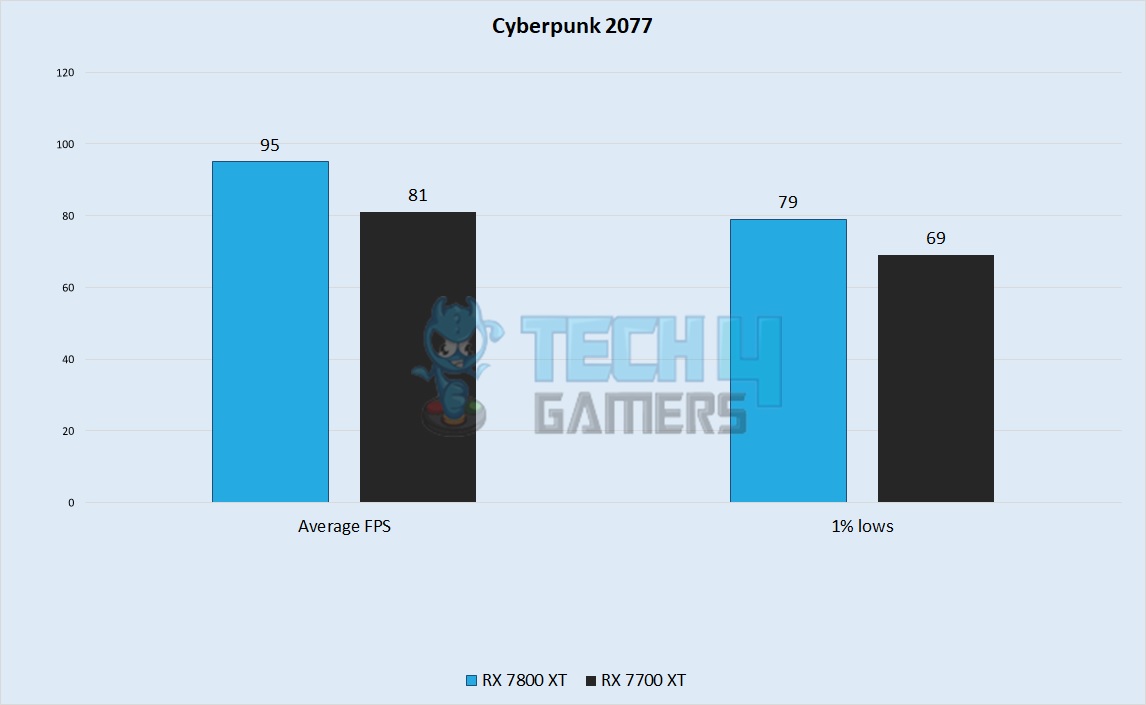
- The Ultra preset in this game, without using any ray tracing, I found the performance of both cards to be smooth at 1440p, though the RX 7800 XT was around 17% faster than its sibling. The RX 7800 XT had an average framerate of 95 FPS, whereas the RX 7700 XT was a bit less smooth, with a performance of 81 FPS.
- As per my testing, the 1% lows of these two cards have ten frames in between them, with the RX 7800 XT going down to 79 FPS in graphically heavy scenes, whereas the RX 7700 XT hovered around 69 FPS.
Atomic Heart
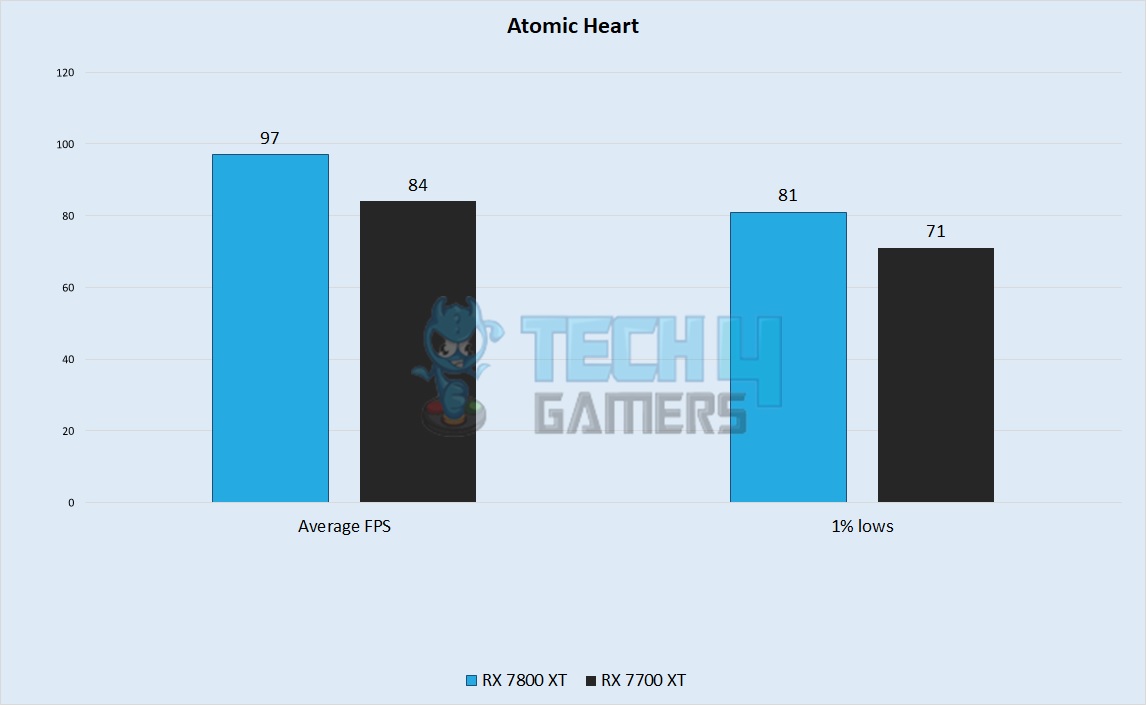
- From what I saw, the Atomic Heart performed a bit better on both cards at the Atomic preset, which decreased the performance difference to around 15%. The RX 7800 XT had an average framerate of 97 FPS, while the RX 7700 XT got 84 FPS on average.
- The 1% lows had a similar difference, with the RX 7800 XT bottoming out at 81 FPS whilst the RX 7700 XT maintained 71 FPS.
Red Dead Redemption 2
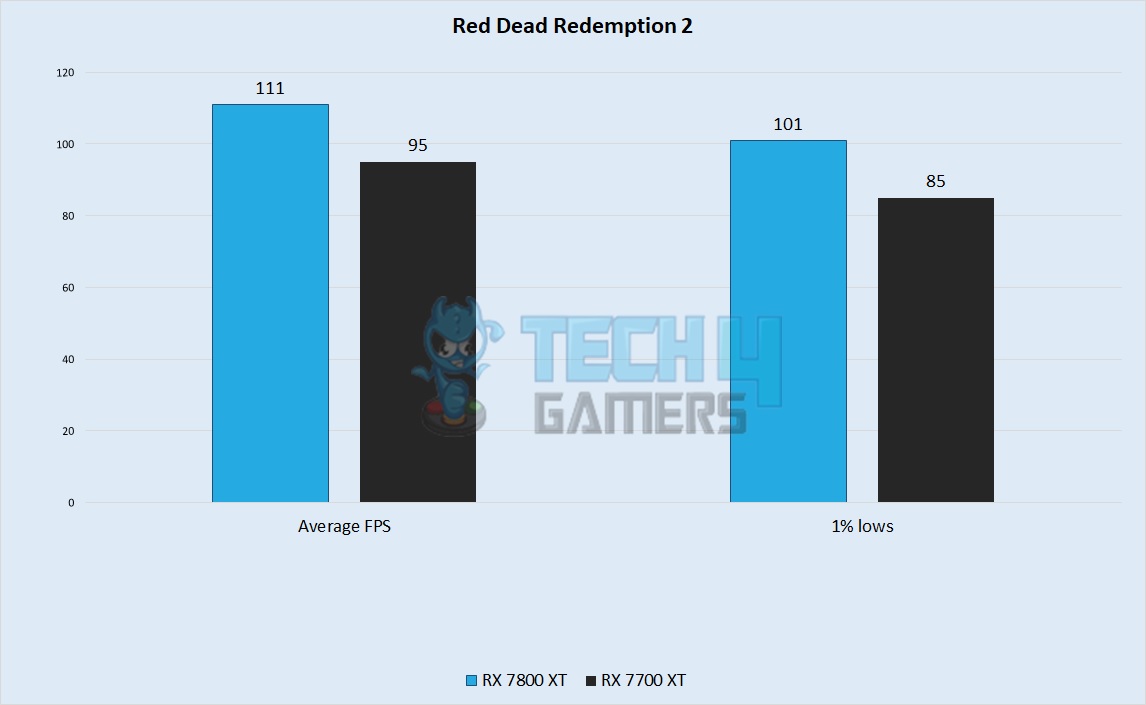
- I used the Ultra settings in RDR 2 with the Vulkan API once again to highlight the capabilities of these cards, with the advantage for the higher-end card being around 18% in this title. The RX 7800 XT had an average framerate of 111 FPS, whereas the average of the RX 7700 XT was closer to 95 FPS.
- As per my observation, both cards lost ten frames in demanding scenarios. The 1% lows of the 7800 XT stayed at around 101 FPS, whereas the RX 7700 XT had lows of around 85 FPS.
Returnal
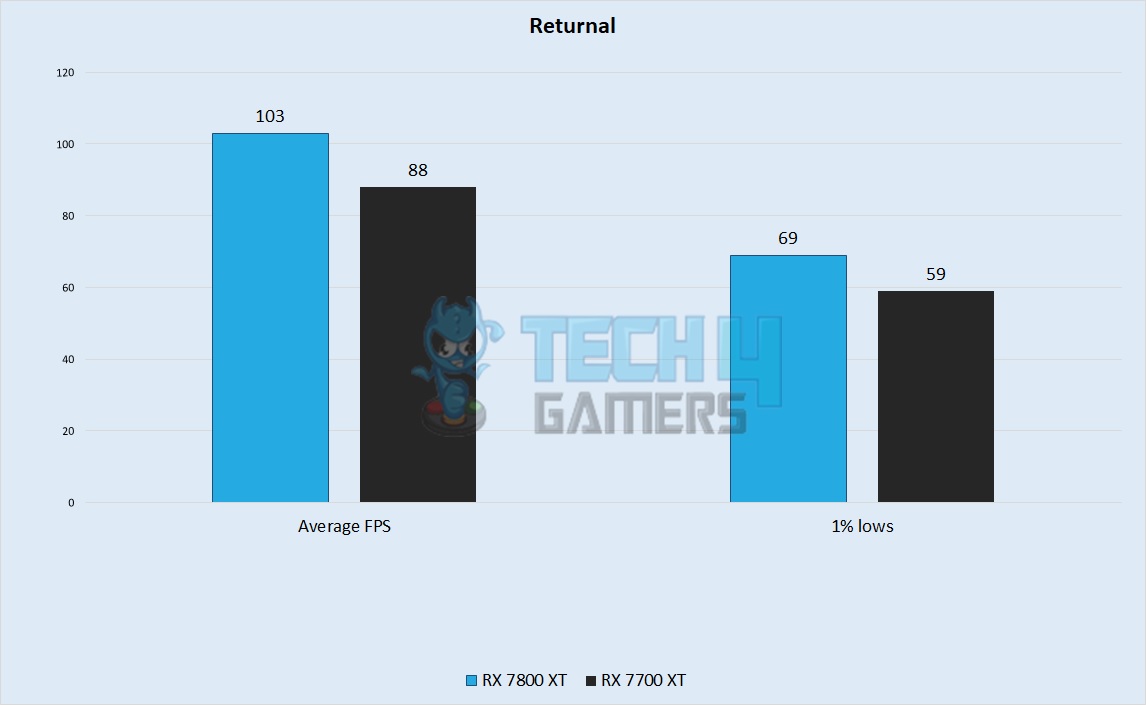
- I played Returnal at the Epic preset on both GPUs. From my experience, the RX 7800 XT was around 17% more performant than its sibling. The higher-end card got around 103 FPS on average, whereas the RX 7700 XT was stuck with an average of around 88 FPS.
- The stutters were the most noticeable for me in this game so far in my testing. The RX 7800 XT had 1% lows of 69 FPS, whereas the RX 7700 XT got around 59 FPS. These stutters are characteristic of some games made on the Unreal Engine and do not represent any problem with the cards.
The Last Of Us
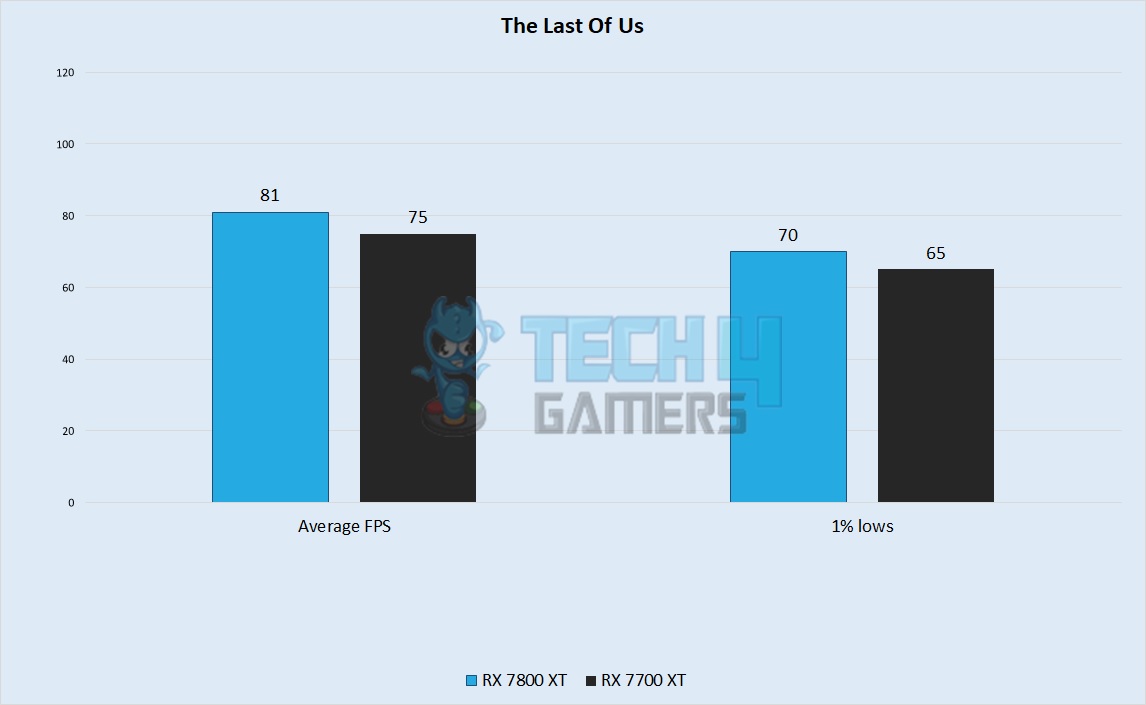
- The final game in my testing closed the gap between the two cards, with only an 8% performance advantage for the RX 7800 XT. With real-time reflections and real-time cloud shadows turned off, the RX 7800 XT had an average framerate of 81 FPS, whereas the RX 7700 XT had a framerate of 75 FPS.
- 1% lows were also close between these two cards, with the RX 7800 XT going down to around 70 FPS in my benchmark run, whereas the RX 7700 XT had a minimum performance of 65 FPS.
Overall Gaming Performance
Now that I have the information to evaluate the RX 7700 XT vs RX 7800 XT in a broader context, I will present the important metrics of these cards in this section.
Framerate
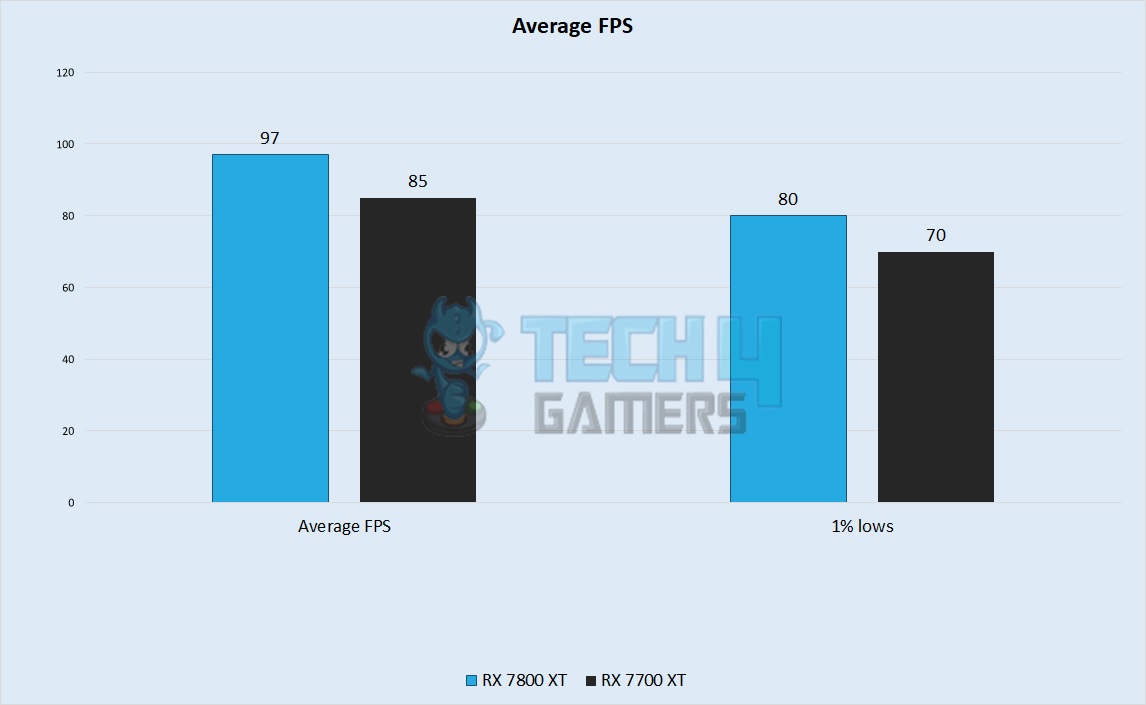
- On average, in rasterized games, the RX 7800 XT is about 15% faster than the RX 7700 XT.
- The average framerate of the RX 7800 XT hovered around 97 FPS in my testing, whereas the average framerate of the RX 7700 XT was around 85 FPS.
- 1% lows weren’t bad on these cards, either. The RX 7800 XT had average lows of around 80 FPS, whereas the RX 7700 XT’s average was closer to 70 FPS.
- These tests included FSR, as some games turn it on by default when setting a higher-quality preset. This shows that AI upscaling has become vital to get a smooth and enjoyable gaming experience despite it seeming like cheating.
- These tests did not include ray tracing, as these cards have not matured in that category enough to make playing games with this setting an enjoyable experience unless you play at a low resolution with some settings turned down.
Power Consumption
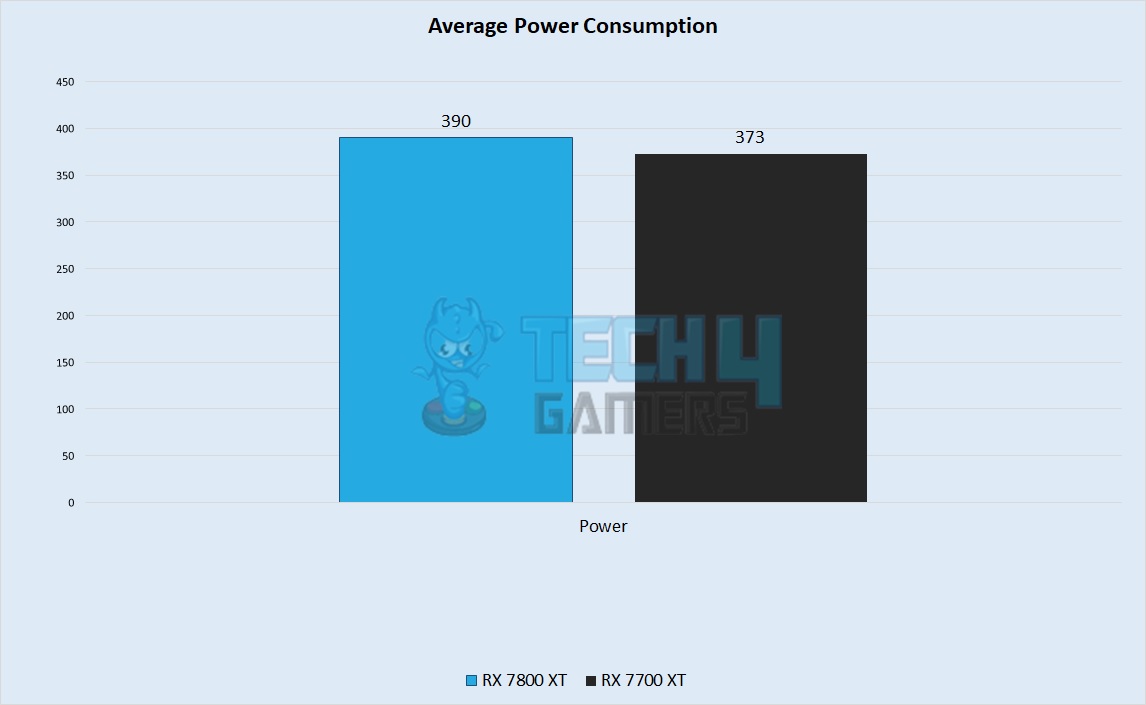
- Surprisingly, the power consumption of the RX 7800 XT and RX 7700 XT was very close. My test bench drew a total of 390 watts when fitted with the RX 7800 XT, whilst it drew around 373 watts with the RX 7700 XT.
- This small difference in power consumption showed the RX 7800 XT to be around 10% more power efficient than its little brother.
- There are many factors at play in deciding the power consumption of your graphics cards, one of which is the cooling solution, which can change from one model of card to another. With how close the power consumption of these cards is, you can expect to see them switch places with different variants.
Price And Availability
The RX 7800 XT has a launch MSRP of $499, whereas the RX 7700 XT debuted along with its bigger brother with an MSRP of $449.
Both the RX 7700 XT and RX 7800 XT can be found at most computer parts retailers.
RX 7800 XT Vs. RX 7700 XT: Which One Would I Recommend?
Now that I have highlighted the differences between the RX 7700 XT and RX 7800 XT, I will guide you to the best purchasing decision for you in this comparison section.
The RX 7800 XT is the hands-down my recommendation. It performs around 15% faster than its younger brother while only coming at a fifty-dollar price increase.
The RX 7700 XT is rumoured to drop in price drastically to be more competitive, as its bigger brother is eating up all its sales. I recommend not splurging for the card until it hits the $400 mark.
If you end up with either card, you will not be disappointed with their performance at 1440p. If you wish to drive more pixels or play a particularly demanding game, both cards support driver-level integration of FSR, meaning you don’t have to worry about games supporting this feature anymore.
To conclude, I think that the RX 7800 XT is a clear winner over the RX 7700 XT in more aspects than what the $50 price difference would suggest.
Pros And Cons
| GPU | Pros | Cons |
| Radeon RX 7800 XT |
|
|
| Radeon RX 7700 XT |
|
|
Frequently Asked Questions
Either the pricing team does not know how the market works, or they made the price of the RX 7700 XT intentionally close to its bigger brother so it could act as a stepping stone to get people to buy the 7800 XT.
Some titles use ray tracing more efficiently by only utilizing them in parts of the lighting environment. Still, those games look almost identical to their rasterized versions that run much smoother.
For the product class, yes, it performs great compared to the rest of the market.
Similar Comparisons:
Thank you! Please share your positive feedback. 🔋
How could we improve this post? Please Help us. 😔
[Hardware Reviewer]
Hi! I’m Ali Tauseef, and I have been writing for Tech4Gamers since 2022. I love all things computer hardware but am particularly fond of CPUs and motherboards, and I like to stay up-to-date about the latest advancements in these worlds, and when possible, write about it. When I’m not doing that, I like to get into a little FPS action in CS2 or get lost in the vast world of RDR2.
Get In Touch: ali@tech4gamers.com


 Threads
Threads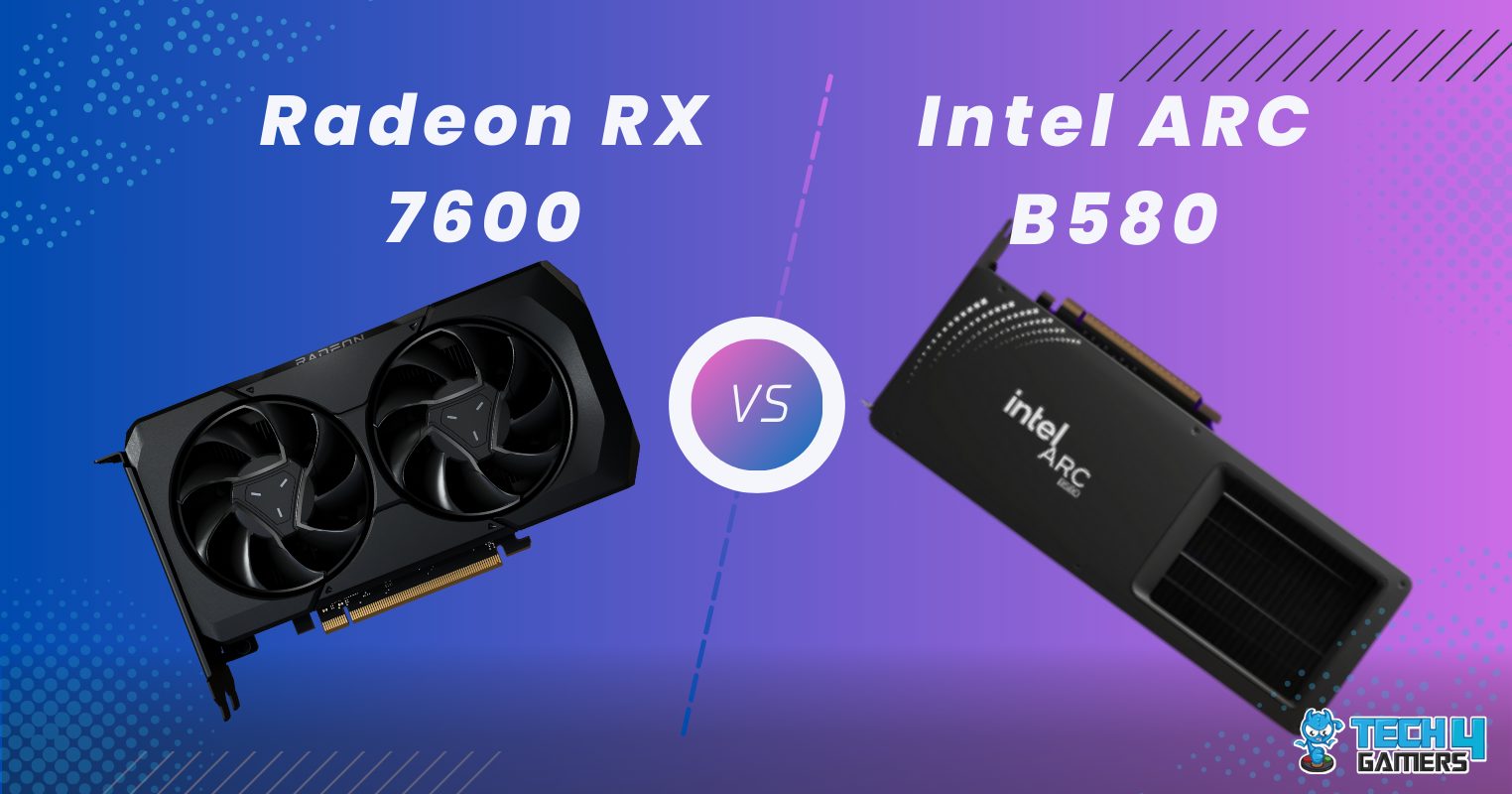
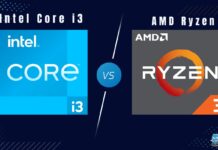
![Intel i9-12900K Vs. i9-12900KS [6 Games Tested]](https://tech4gamers.com/wp-content/uploads/2022/06/CPU-Comparison-Template-NEW-1-218x150.jpg)
